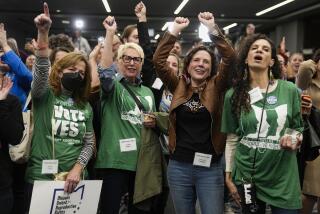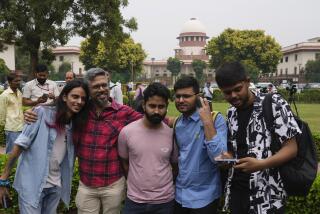Supreme Court clears the way for gay marriage in 11 more states
Just 12 years ago, it was illegal for gays and lesbians to marry anywhere in the U.S.
But Monday, the drive to legalize same-sex marriage — which began some two decades ago as a seemingly far-fetched quest — neared final victory as the Supreme Court cleared the way for gays and lesbians to marry in 11 additional states, bringing the total to 30 plus the District of Columbia.
Now, more than half of Americans live in a state that offers, or will soon offer, what supporters call “marriage equality.”
Social conservatives had seen the high court as their last hope to halt the rapid advance of gay marriage. But in a surprise move, the justices rejected without comment appeals from five states whose bans against same-sex marriage had been struck down by lower courts.
The decision means gay marriage will be legal even in the South. Virginia, one of the states whose laws were invalidated when the high court refused to intervene, began issuing marriage licenses to same-sex couples within hours.
By not issuing a formal ruling, the justices put off the question of whether the Constitution guarantees gays and lesbians a right to marry. Although the outcome does not set a legal precedent that binds lower courts, it did send a strong message that same-sex marriage could soon be legal across the country.
The court’s decision made gay marriage immediately legal in Utah, Oklahoma, Virginia, Indiana and Wisconsin.
Six additional states will be affected because they are in the same federal appellate circuit court districts that have declared gay marriage bans unconstitutional: North Carolina, South Carolina, West Virginia, Colorado, Kansas and Wyoming. Separately, 19 states had legalized same-sex marriage.
The high court’s action capped a legal and political reversal of nearly unprecedented proportions on what was once one of the nation’s most divisive social issues.
James Esseks of the American Civil Liberties Union called the action “a watershed movement for the entire country. We are one big step closer to the day when all same-sex couples will have the freedom to marry.”
Indeed, the number of states where gay couples can marry will probably grow again soon, since the San Francisco-based U.S. 9th Circuit Court of Appeals is expected to issue a ruling that would strike down gay marriage bans in five Western states under its jurisdiction: Nevada, Idaho, Alaska, Arizona and Montana.
Once that happens, bans on same-sex marriage will remain enforceable in just over a dozen states in the Midwest and South. What will happen there is the key question, which Monday’s action left unresolved.
The justices will not allow the Constitution’s guarantee of “equal protection of the laws” to mean one thing in one region of the country and something different in another — at least not for an extended period.
One possibility is that judges in the appeals courts that have not yet ruled will take a cue from the high court and strike down the remaining bans.
But judges from the U.S. 6th Circuit Court of Appeals, based in Cincinnati, heard an appeal recently, and their comments during the oral argument suggested they may uphold “traditional marriage” laws in Ohio, Michigan, Kentucky and Tennessee.
If they or one of the other appellate courts that have not yet ruled upholds a state ban, gay rights lawyers will appeal. The Supreme Court will then be nearly certain to tackle the case, although perhaps not until next fall.
For now, however, the justices avoided the issue.
The court’s four liberals see no compelling reason to hear an appeal when courts are overwhelmingly ruling in favor of gay marriage. A few weeks ago, Justice Ruth Bader Ginsburg said there was no “urgency” to decide a same-sex marriage case.
Ginsburg, the court’s senior liberal, has often said she believes in a step-by-step approach when constitutional rules are changing. In the 1970s, as a civil rights lawyer, she brought a series of women’s rights cases to establish the principle that the law may not discriminate against people based on gender.
Conservatives on the court may have decided that the battle over gay marriage is not worth fighting at this time. Public opinion polls show a majority of Americans support same-sex marriage, particularly younger people.
Since the high court struck down portions of the federal Defense of Marriage Act in 2013, gay marriage advocates have won an impressive string of legal victories.
Monday’s outcome may also reflect uncertainty within the high court. Chief Justice John G. Roberts Jr. has often shown a willingness to put off decisions when the court is closely split. Last year, for example, the justices refused to hear several cases testing the limits of new state regulations on abortion.
The four most conservative justices are still believed to oppose declaring gay marriage a constitutional right. That would have provided enough votes to hear the appeals, but at least some of them were clearly unwilling to accept a case at this time — perhaps out of concern that the swing vote on the issue, Justice Anthony M. Kennedy, would join with the liberals to rule for a nationwide right to gay marriage.
Monday’s action was greeted as an important win by gay rights advocates.
“The Supreme Court has chosen not to stand in the way of love,” said Jon Davidson, legal director for Lambda Legal, a gay rights advocacy group. “Now we need a national solution so that, no matter where you live, same-sex couples can have access to the dignity and respect that only marriage can provide.”
The conservative Alliance Defending Freedom emphasized that the high court had not ruled squarely on the issue.
The “decision not to take up the issue now means that the marriage battle will continue,” said the group’s senior counsel, Byron Babione. “The people should decide this issue, not the courts.”
The gay rights movement has followed a careful step-by-step strategy. In 2003, advocates won the first ruling that upheld gay marriage before a Massachusetts state court.
Last year, they won an important stepping-stone ruling when the Supreme Court, by a 5-4 vote, struck down DOMA, the federal law that denied equal benefits to legally married same-sex couples.
Also last year, the court was asked to rule on the constitutionality of gay marriage as part of conservatives’ appeal to uphold California’s ban, Proposition 8. The court punted on the broader issue, but allowed same-sex marriages to resume in California.
Since then, state laws forbidding gay marriage have fallen like dominoes. When pressed during appeals, state lawyers failed to give a convincing justification for denying marriage to committed gay couples, many of whom were raising children.
Conservative activist Ralph Reed predicted that court actions to legalize gay marriage would help Republicans in the coming midterm congressional election.
“We’re going to be in this fight for a long time,” Reed said from his base in Atlanta. “In this case, there were five states which all defined marriage as between a man and a woman, and the Supreme Court would not lift a finger to defend those states’ laws.”
But Virginia Atty. Gen. Mark Herring said the Supreme Court’s action suggested legalized gay marriage was inevitable.
“Letting these rulings stand should be a strong message of the court’s leanings,” said Herring, who had refused to defend Virginia’s ban.
By midafternoon Monday, Erika Turner, 26, and Jennifer Melsop, 26, both of Centreville, Va., became the first same-sex couple granted a marriage license in northern Virginia’s Arlington County. Grinning and wearing white, the couple received their license in front of the Arlington County courthouse and had a brief marriage ceremony.
“We tried to plan a wedding in other states, but we couldn’t pass up the opportunity to get married in our own state,” Turner said, adding that one of her first actions would be to put Melsop, a student, on her health insurance.
They urged couples elsewhere to continue advocating for equality. “Keep fighting in your own state,” Turner said. “If you flock to states where it is legal, you don’t help the states where it isn’t.”
Times staff writers Timothy M. Phelps in Washington and Matt Hansen in Arlington, Va., contributed to this report.
More to Read
Start your day right
Sign up for Essential California for news, features and recommendations from the L.A. Times and beyond in your inbox six days a week.
You may occasionally receive promotional content from the Los Angeles Times.







